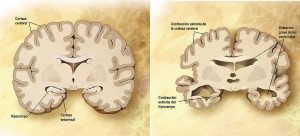Music enhances memory in Alzheimer’s
Dear Reader,

I am writing to you today from Senate House in London.
This year I have had the pleasure of being the School of Advanced Study‘s Visiting Fellow, a post that comes with a short-term residency in their pretty amazing Art Deco office. I have been made to feel very welcome and am enjoying all the benefits of seeing much missed colleagues and friends in London.
I don’t miss London per se however. It is an amazing city, a fabulous place to visit, but I would not live here again. Turns out you can take this girl out of Yorkshire – but only temporarily!
The last couple of months have been rather crazy with the launch of Music and Wellbeing, my new research unit at the University of Sheffield. I have also been grant writing again and completing my research study with Lost Chord looking at the experience of live music in dementia care homes. It is in this last regard that I came across a new article about memory in Alzheimer’s disease – and the intriguing possibility that music might help function.
 It is widely reported that memory for music can withstand the ravages of memory loss that people experience with all forms of dementia, including Alzheimer’s disease. These losses are due to destruction of brain tissue (see image). Can music help support the other forms of memory that are under attack?
It is widely reported that memory for music can withstand the ravages of memory loss that people experience with all forms of dementia, including Alzheimer’s disease. These losses are due to destruction of brain tissue (see image). Can music help support the other forms of memory that are under attack?
Juliette Palisson and her colleagues have published a new paper in the Journal of Clinical and Experimental Neuropsychology called ‘Music enhances verbal episodic memory in Alzheimer’s disease (AD)‘. The study reports the findings of an experiment conducted with the support of 12 patients with mild AD and 15 healthy controls, and shows how music as opposed to visual stimuli can help memory for text.
In general music has been associated with a range of potential benefits in AD. These include a reduction in behavioural disturbances, improved mood and emotional states, increased spontaneous speech and verbal fluency, and to a lesser extent, better attention and focus.
For me (as a person interested in memory) the findings surrounding music and memory in AD are the most interesting. Patients with AD recall more autobiographical memories in response to music compared to silence, and music can also enhance short-term recall.
The question for the present paper is can music help to learn verbal materials, something that might have important consequences for the future of care.
Does music work well as a mnemonic device in AD? More importantly, if it does, is it any better a mnemonic device than other kinds of stimuli, such as visual triggers?
Participants
Twelve patients with AD and 15 healthy controls, all native French speakers with no musical expertise, were recruited for the study. The groups did not differ in age, education, gender distribution, auditory or musical perception skills, or mood. As expected the patients with AD had lower global cognitive functioning.
Materials
 Familiar music or a film excerpt were used to pair with new text. Each excerpt lasted 40 seconds and was pre-rated to be matched on arousal and valence. The music chosen was Ode to Joy (Beethoven) and the film was Modern Times (Charlie Chaplin).
Familiar music or a film excerpt were used to pair with new text. Each excerpt lasted 40 seconds and was pre-rated to be matched on arousal and valence. The music chosen was Ode to Joy (Beethoven) and the film was Modern Times (Charlie Chaplin).
Three texts were chosen that each contained 8 lines: one was about holidays, one a shopping list and one was about a birthday dinner. The texts contained familiar words and rhymes to help memory.
The texts were recorded by a female voice in both spoken and sung (to the Ode to Joy) form. The sung version was used in the musical condition and the spoken was used for both the control and visual conditions.
The tests
Each participant took part in all trials, with the three conditions (spoken (control), musical pairing and visual pairing) rotated to prevent order effects. Note however, the texts were not rotated across conditions, a potential weakness of the study.
People were asked to listen to the text over headphones and remember as much as they could. In the film condition the visuals were in one half of the screen with the text presented in the other.
There was a learning protocol, stages over which the individual lines of text were presented and testing performed until memory was at least 65% accurate.
After the learning was completed the experimenters tested immediate and delayed (5 minute) free recall memory of the texts.
Results
- Learning – The healthy controls learned more text overall than people with AD, which was expected (6.9 lines vs. 4.7 lines). The film (visual) condition helped both groups more than simple spoken presentation, but the musical condition was significantly more successful than both in promoting memory for the texts (5 lines vs. 5.7 lines vs. 6.8 lines)
- Immediate recall – The healthy controls recalled more text overall than people with AD, which was expected (87% words vs. 74% words). The pattern of increasing performance outlined above, from spoken to visual and finally musical, was repeated (74% vs. 80% vs. 88%)
- 5 min delay – The healthy controls recalled more text overall than the AD patients (66% words vs. 24% words). The pattern of increasing performance outlined above was repeated (32% vs. 47% vs. 56%)
The authors note that 8 AD patients were unable to recall any of the words in the control spoken condition at delayed recall point. This number dropped to 4 people for the two associative conditions (visual and musical).
There was also one significant correlation of interest: that between the musical effect on delayed recall and patients’ working memory score. People with better working memory scores benefited the most from the presence of music.
Conclusions
This is the first study to compare the effect of a musical mnemonic device to a non-musical mnemonic, in this case film. It is important to note that both pairings improved memory performance in both groups compared to simple spoken presentation of new texts. But the music appeared to convey an additional benefit; again, to both groups.
The authors claim that the familiarity of the music helped memory, though of course this was not tested in their study as they presented no unfamiliar music. Their assumption is supported by a study I just completed with my colleague Jakke Tamminen (Royal Holloway) looking at learning and memory for text in music in healthy adults. I will let you know if (hopefully when) that paper is published, Dear Reader.
It would be good to test at some point if this music familiarity facilitative effect is also true for AD patients as this would permit more effective selection of mnemonic materials. It would also suggest that we should be noting familiar music at the stages of early AD diagnosis, in order to help each person build effective mnemonic aids for them.
Why does music work?
 One possibility is that music provides a richer context for learning, richer even than a visual scene.
One possibility is that music provides a richer context for learning, richer even than a visual scene.
The high relative working memory skills of the patients in this study might have allowed them to take advantage of this rich bound representation, creating less demands on areas of the prefrontal cortex when retrieving the text materials compared to when they were encoded in isolation.
Although the music and film were rated as equal on arousal and valence by another group of people, it is possible that the music was more emotional than the film for the AD patients and the controls who took part in the study. Higher emotions are associated with a facilitative effect in memory.
Finally, music may just be a better binding agent for text than visual scenes as it contains clear points of structure and parsing allowing for easier integration of elements. We are also very used to binding music and text in everyday life as we learn lyrics. To do the same with visual elements is a more rare concept.
As we move forward with our understanding of how music can support memory in dementia it is increasingly clear that we need to focus more on HOW music has any effect rather than simply showing that effect. That point is now made. Let’s find out why!
—
That is it for now, Dear Reader. I have a grant to finish, lots of lovely ethics applications for my autumn work plan to submit, and prep work for ESCOM to be done. It may be the summer months but it is still all go for me!


